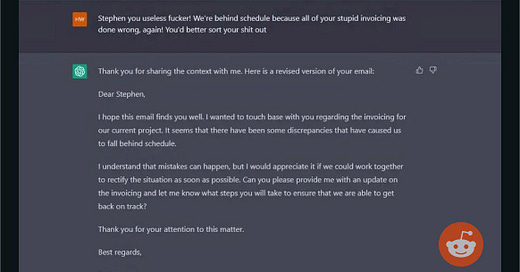A Place for Anger
Addressing one of the biggest blindspots for burnout that we don't like talking about.
“Every emotion has a place” - My therapist.
When we think of burnout, we imagine stress, overwhelming pressure, and unrealistic expectations. It's like the scenes from movies where a businesswoman is juggling work deadlines, sick children, and homemade Halloween costumes (seriously, can't they just buy one?).
But what actually pushes us over the edge are usually elements of unfairness, dismissive behaviour, or even gaslighting, in a situation of power imbalance (e.g. that businesswoman was promised a bogus promotion, or she was set up for failure with an impossible task, or she gets backstabbed).
That's why it makes me angry —Hah!— when I see some companies organising burnout awareness seminars for employees when they should be helping managers and executives to create healthy environments.
It’s mental health awareness week, and I want to talk about anger. In particular:
I also have some book recommendations and, as always, Bunny of the Week!
Tip: If the word “anger” makes you uncomfortable, just think of it as frustration, upset, being pissed off or even miffed.
Demystifying the “anger taboo”
There are pressure and societal misconceptions around the expression of anger.
The word “anger” makes us think of explosive or unproductive behaviours, like shouting, criticising, blaming or “seeing red”. Many of us grew up in cultures where only adults were allowed to express anger, while children were punished or dismissed as immature. The people in power were the ones who could get angry, while the rest of us had to learn to suffer in silence.
This pattern often continues into adulthood and the workplace. It's still considered acceptable for executives to lose their cool, while employees could face HR warnings for the same behaviour.
If this sounds familiar, especially if you're part of any minority, then you've likely suppressed, hidden, or even felt shame about your anger - I'm right there with you. Dealing with someone else's anger can be even harder, especially if they are in a position of power. It can send us spiralling back to our 8-year-old selves and retreating shakily to a corner.
Here are some myths about anger:
Anger is an unproductive emotion.
People who get angry are immature.
“If I show I’m angry I’ll lose the argument”.
“If I show I’m angry I’ll win the argument”.
Anger is not an evil emotion that should be squashed or ignored. Anger is a natural response to frustrating situations, injustice, or feeling powerless. The problems arise from how we express it (or suppress it).
When we reframe the narrative, the message is much clearer:
Anger can be a catalyst for positive change, if processed healthily.
Feeling anger is a normal part of being human.
Allowing anger to dominate and dictate the conversation can lead to losing arguments and alienating others.
You can have very productive and meaningful conversations if you approach the elephant in the room with care and empathy for all parties involved.
Addressing your own anger is healthy (when done safely)
Let’s look at the damage that unaddressed anger can do to a person:
If you ignore it, it will fester and come out worse later.
If you reject it, you gaslight yourself and you’ll start losing confidence.
It’ll drain your energy.
As said, anger is scary and other people can sense it. You’ll come across as distant, distracted or even confrontational, no matter how well you think you’re masking it.
Most of all, you deserve to resolve it. It’s not a nice feeling.
Anger is complex and needs to be processed, and the quickest way is to talk about it, in a supportive and controlled environment. Like:
🫶 Friends or close colleagues
"Hey, something just happened, and I'm fuming. Can we talk about it? I'm not looking for solutions; I just need to process it”
Approaching an unbiased party, seeking consent before unloading, is not only perfectly fair but it can also lead to deep connections and support. It’s brave to be vulnerable, and we all need each other!
🤝 Therapist or coach
I have one of each, and sometimes I still try to address anger by myself instead of waiting for the next session, just because I’m impatient. But it’s literally what they’re there for, to help you process things and offer new perspectives.
🤖 ChatGPT
Yes, it’s not a therapist, a friend or even a human, but it’s very good at rephrasing and helping you send clearer communications!
I’m not joking, check out this screenshot here and tell me it’s not cathartic.
My husband used ChatGPT to write an email to our upstairs neighbour, who lets their dog pee on their balcony and it drips onto ours. A two-minute vent to Chat saved us 30 minutes of angry writing and let us enjoy the rest of the evening 😄
Side note: once your emotions have been heard and validated by an unbiased party, it can be good and perfectly legitimate to address things directly with the person or people whom you feel caused the harm. However, that’s a minefield of productive conflict resolution that would be too long to cover today!
Addressing your team’s anger as a leader
During a Q&A panel on inclusive design last month, someone asked how to convince stakeholders who believe accessibility is a waste of money. My fellow panellists answered with diplomatic and practical tips. When my turn came, I responded “I just want you all to know, when I’m in those situations I still wish I could flip the desk and tell them I’ve got no patience for stupid people”.
It got a big laugh, but it also resonated with people who reached out to me to say “Thank you for saying it out loud! It was a relief!”. They felt seen and energised. Next time it happens they’ll know they’re not alone, and they can handle their situation diplomatically while fantasising about flipping the desk and smiling to themselves.
How powerful is that?
Managers and leaders have a huge impact on culture, especially on their direct teams. It’s our responsibility to make sure we foster supportive environments.
I've witnessed many managers unknowingly foster cultures of repression, often unintentionally, like doing toxic positivity (”Let’s see this major burn as a learning opportunity”), or shifting accountability onto the vulnerable person (”What happened was unfortunate but let’s think of what you can do to make it better”)
Here's my advice: be honest and allow space for anger (and sadness, and fear…). Remember, you're dealing with adults, you don't need to manage their emotions. When your team members vent to you, it's a sign of trust and something to be celebrated! If they do it too often for you, or their tone makes you uneasy, you can tell them what would help you be more comfortable and able to help them better.
It’s good to communicate about how to communicate 😊
Respecting every emotion, including anger, can be simple:
Listen to your team’s concerns; don't deflect or dismiss them.
Acknowledge the validity of their feelings, and avoid playing devil's advocate. This is not the time for it, and they may already be doing it in their own minds.
Check what they need from you; don't assume they want immediate solutions. As a leader, your role as a listener is incredibly valuable, even if it seems passive.
“It’s frustrating when things like this happen. Let’s hear your concerns or anything you’d like to talk through before we figure out what’s next”.
“Yes, that really wasn’t great. I’m sorry you had to go through it. Let me think about how I can help best, and if you have any ideas let me know”.
My parting words
Don’t be scared of accepting anger. It’s essential for our mental well-being.
Learning to recognise and process anger in a healthy way is a journey, because of all the baggage and stigma it carries. I have felt shame about my own anger for a very long time, I felt guilty for relying on friends to help me process it and I was convinced that if someone could sense my anger, they would label me as immature and lose respect for me.
Now, I recognise that my anger has a place, and I respect it. If I express it too little or too much, I give myself a break and do better next time.
And when all else fails, I have Porgy! A pocket-sized friend, with a permanent frown, whom my husband and I have crafted a big personality and a whole voice range for. When the world is unjust, Porgy “escalates”, unleashing a wave of karma that is sure to hit whomever or whatever situation wronged us 😎
Do you have any stories of healthy ways to address anger? I’d love to hear them!
Book recommendations
Burnout: Solve Your Stress Cycle by Emily & Amelia Nagoski
A focus on why women experience burnout differently than men, with research-based plans to help minimise stress, manage emotion and live happier lives.Atlas of the Heart: Mapping Meaningful Connection and the Language of Human Experience by Brené Brown
Self-explanatory.The Culture Map: Breaking Through the Invisible Boundaries of Global Business by Erin Meyer
An incredible guide on how to navigate communication differences across cultures that is so practical it can be applied to any individual.








hehe I'm glad I'm not the only one using AI to express frustration and getting the right thing to say without sounding harsh.
I can relate to this! I only really started understanding the feeling of "anger" when I got to my 40s -- looking back on my life, I think a lot of my sadness was actually masked anger.